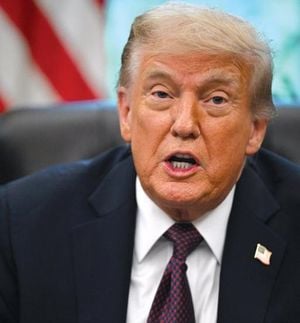Artificial Intelligence has been making waves, especially within social media and creative spaces, and its impact is now more visible than ever. Just recently, TikTok faced significant backlash due to users translating and sharing Adolf Hitler's speeches using AI-generated content. This disturbing trend drew attention when videos featuring these translations racked up millions of views before they were taken down. While TikTok reported they acted swiftly, removing the majority of this content, the question remains: how is AI shaping social media interactions and content generation?
Content moderation is one of the core challenges for platforms like TikTok, which has found itself at the crossroads of user-generated content and unfiltered historical narratives. Despite the platform's commitment to removing harmful material, the algorithm-driven nature of social media makes moderation increasingly difficult. A few users have blatantly violated TikTok's guidelines, promoting hatred under the pretext of re-examining historical speeches, and have received overwhelming views as validation.
Social media platforms are now grappling with the ethical responsibilities of AI content generation. AI can create and modify content at lightning speed, making it more accessible but also prone to misuse—especially when the narrative it pushes can glorify or promote harmful ideologies. The emergence of Hitler speeches on TikTok, albeit for sensational engagement, showcases the darker side of this technology. Users often married these speeches with popular music, aiming to engage viewers through shock value rather than serious discourse.
Meanwhile, Reddit has emerged as another fascinating case for AI's influence. Once frustrated by artificial intelligence entities scraping their vast user-generated data, it has now turned the tables and found them to be valuable partners. Reddit's structure favors AI training due to its organized content and candid nature. AI companies are licking their chops for conversational data, and Reddit has found itself playing host.
AI companies increasingly rely on platforms like Reddit, which provides conversation snippets curated by users who are freely sharing thoughts and insights on countless topics. By training models on this real-sounding dialogue, AI can improve its ability to mimic human conversation. Companies like OpenAI and others are leveraging this data to refine their algorithms, producing more sophisticated and lifelike interactions.
But this raises questions about the ownership and ethical use of content generated through social media platforms. How long before users notice their conversations are being appropriated without credit or compensation? Things have shifted; companies now rely on platforms like Reddit instead of seeking permission. An AI-driven age compels users to adjust their expectations and awareness of how their content may be used.
Stacked against traditional forms of content production, AI image generators have joined the fray, transforming how visuals are created and shared online. One prime example is the new Grok Aurora model, which allows users to generate images based on simple text prompts. It’s tied to the X platform (formerly Twitter), indicating the increasing overlap between social media and AI capabilities. This model showcases how AI tools can shift the creation of digital art from professional hands to casual users, allowing anyone with internet access to produce images at will.
Through Grok, users can upload images or even create new ones merely by describing what they want with amazing specificity. Perhaps one of the most interesting aspects of Grok is its ability to edit existing images. Users report having altered real photographs to introduce cartoonish elements, like transforming pets to look like characters from popular anime.
What does this mean for traditional artists and content creators? While these tools democratize creativity, they also invoke fears about the future of art; how can artists compete with machines producing at the speed of light? The line blurs between original art and generated images, posing existential questions about creativity and the value of handcrafted versus algorithm-generated works.
Image generation has its critics, of course. Some artists express concern about their work being (re)appropriated within AI models without permission, making the process not only unethical but also potentially illegal. Music creators have echoed similar sentiments as their tracks get resurfaced alongside disturbing content, often making it hard to identify and mitigate these copyright violations.
AI-generated content brings both thrilling possibilities and serious dilemmas. Platforms find themselves needing to not only engage audiences but also protect them from harmful content. For users, there’s empowerment to innovate but also the responsibility to advocate for ethical practices surrounding content generation. While AI democratizes opportunities for expression, it simultaneously raises compelling questions concerning ownership, creativity, and accountability.
Engagement with AI tools continues to evolve, and their influences on platforms like TikTok, Reddit, and beyond guarantee we’ll see even more fascinating interactions between technology and creativity. The debate surrounding the ethical use of AI tools remains as active as ever, ensuring this topic is far from over.



